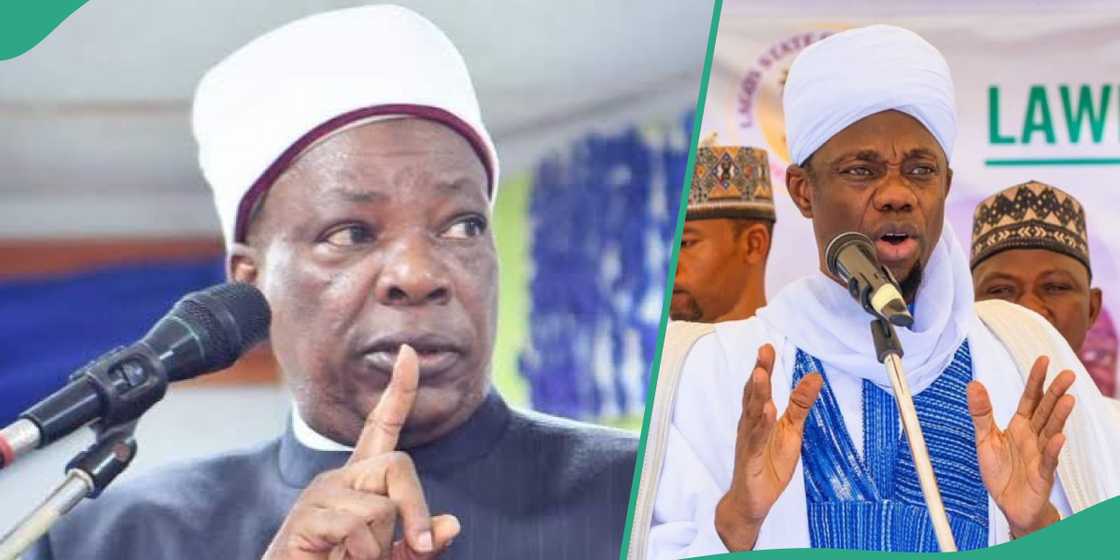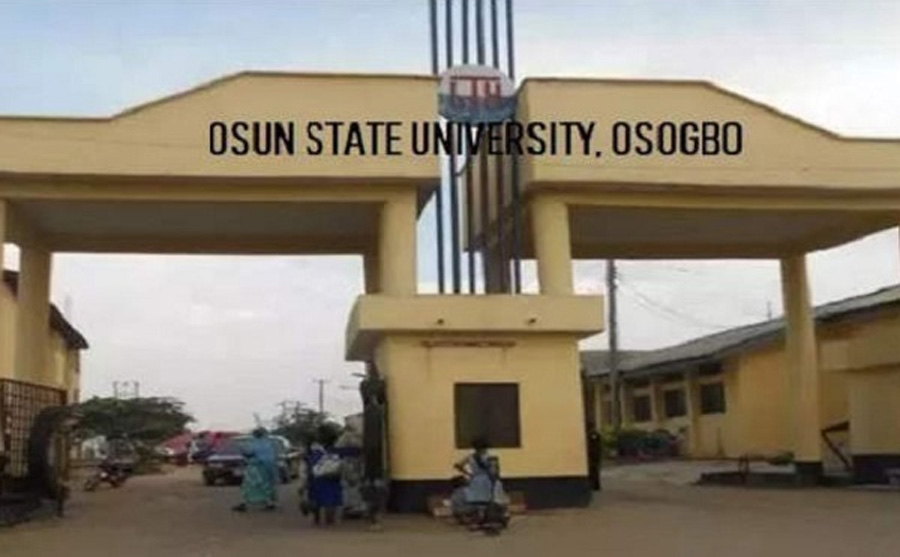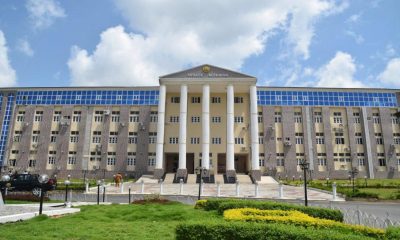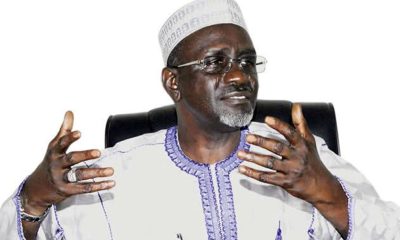metro
It’s Surprising I Became A Bandit – Turji

A notorious bandit, Bello Turji, has opened up on his past, leading to his becoming one of the most dreaded bandits terrorising communities, especially in the northwestern part of Nigeria.
Bandits like Turji have been terrorising villages in northern Nigeria for years, killing thousands of people and displacing a lot more. They also engage in isolated and mass abductions, including students in at least 10 schools in less than a year.
In a recent report, Daily Trust chronicled how hundreds of thousands of villagers had been displaced from their settlements, with many of them seeking refuge in Niger Republic and other Nigerian cities as governments in the affected states fail to provide camps for displaced persons.
In an exclusive chat aired as part of a Trust TV documentary, tagged ‘Nigeria’s Banditry: The Inside Story,’ Turji, who hails from Fakai village of Shinkafi Local Government in Zamfara State, however, said it was unbelievable to people who knew him that he strayed into the criminal activity.
READ ALSO:
- Police nab school principal for allegedly defiling 6-year-old pupil Delta
- Russian Football Union set to lodge CAS appeal over UEFA, FIFA bans
- Presidency: Plot against South East thickens
In separate clips streamed at an event to premier the documentary in Abuja on Friday, Turji said his first experience of slaughtering a human being was on a market day at Shinkafi.
“I hadn’t taken up arms by then. I was herding cattle. Then, if my father wanted to sell any of his cows, I would take it to the market for him. After I sold it I would come to the emir’s compound before returning home in the evening.
“The Emir of Shinkafi knows me. He knew me from many years ago. If he is told that Turji would become a bandit he would not believe it because he knew we Fulani could not become rustlers. But it was what they were doing to us that became unbearable.”
Turji’s claim was in reference to the activities of community self-help volunteer force called Yan Sakai, whose ruthlessness, he said, made him and some other Fulani youths to become bandits.
A researcher in the Ahmadu Bello University (ABU), Zaria, Dr Abubakar Siddique-Mohammed, interviewed as part of the 29-minute documentary, acknowledged that the activities of the volunteer force inflamed the banditry problem across the affected states.
In the ethnic tension brought out by the documentary, both sides of the conflict had engaged in ruthless killings over the claim of self protection or vengeance.
Speaking on restrictions placed in September last year to suppress the activities of the bandits, Turji said, “It is not right to deny Fulani entry into Shinkafi; it’s a local government for all citizens. If you deny Fulani entry, where are they supposed to go?
“If you buy just a measure of maize, they confiscate it; or if you buy a loaf of bread they will say you are buying it for Turji. Is it only Turji who eats out of all the people here?
“Let me ask you; isn’t this a gun? Is it those who failed to prevent the circulation of arms in Nigeria that will prevent us from buying petrol, which even a little kid knows where it can be obtained?”
The bandits’ leader recounted an attack on his family, saying, “Over 1,000 cattle were taken away from us. On that day, six of our little siblings were killed.
“Our parents went through all the courts, but they couldn’t get back their cattle. They also connived with Yan Sakai and slaughtered my uncle. Where then does a commoner seek redress?”
He also accused Yan Sakai volunteers of connivance with security agents to harass and extort the Fulani.
READ ALSO:
- You Lack Capacity to End ASUU Strike, Resign, Students Tell Adamu
- Register under the National Mass Metering Programme and get meters free -Ikeja Electric tells customers
- Viral voice notes revealed missing BRT passenger struggle with her abductors –Brother
“They arrest innocent people and lock them up, and if you ask, they say it is because of corn stalks. You will be fined N500,000, and you must pay, for fear of incarceration.
“I will swear with the Qur’an that the Emir of Shinkafi knows about this. My father was involved in a court case for seven years over corn stalks. Just for corn stalks!”
Turji denounced connections between bandits liking him with Boko Haram elements, saying they have no political agenda.
“We are not interested in establishing any religious organisation. We are not aspiring to have a territory of our own, and we don’t have any political aspiration. We took up arms to protect the lives of our people that are being killed, it is not just because we are merciless or we are unconscious of Allah who created us.”
Some of the victims recalled horrendous experiences from bandits who attacked their communities.
Zainab Ibrahim from Zurmi, whose child was killed and she was abducted and held for two months, recounted her experience.
“Three of them picked my husband and left with him. I was surrounded by six men with their AK rifles and headlamps
“I was sleeping when they grabbed me and my son. They were told he (my husband) had escaped and they said there was no problem since they had us
“My son and I held tight to each other. One of them said, ‘Bring him here so that we slaughter him or we shoot two of them.’
“They snatched him from me. He was crying, I was crying too. By the time they seized him I passed out. They laid down him and slaughtered him.”
A young girl identified as Hauwa said her parents were killed when the bandits stormed their house to rob her father.
Speaking during the screening of the documentary in Abuja, experts and stakeholders called for genuine dialogue and the involvement of the traditional institutions to tackle banditry in parts of the country.
The event, organised by the Media Trust Limited and the Centre for Democracy and Development (CDD), featured a panel discussion and open mic conversation on the banditry problem.
‘Abuja solutions not enough’
A panel discussant and lecturer from the Usman Danfodiyo University, Sokoto, Dr Murtala Rufai, maintained that solutions being proffered in Abuja, the seat of power would not end banditry in the North-West.
Rufai disclosed that bandits see themselves as freedom fighters who have an axe to grind with the government.
The university don called on the federal government to ensure that traditional institutions are empowered to oversee their domains as it was in the past.
He said, “The problem of rural banditry in Zamfara and other places in the North-West is actually a fundamental and basically a local problem. In my opinion, it is a local problem that actually requires a local solution.
‘Reveal funding sources’
On its part, the Kaduna State Government insisted that the bandits were criminals hell-bent on destroying peace in the country.
The Commissioner for Internal Security and Home affairs, Samuel Aruwan, who was part of the screening, reiterated the state government’s position that it would not negotiate with the criminals.
READ ALSO:
- 2023 Presidency: I Can’t Disown Tinubu, Says Emir Of Katsina
- Court Orders Release Of Hanifa’s Self-Confessed Killer’s Wife
- Alleged defilement: I was Princess’ benefactor, lover, says Baba Ijesha
- I stayed underground in Kharkiv for 24hrs, thought I’d never see my parents again —Ukrainian returnee, Ajayi
He said it was high time the economic activities of the bandits were probed to know how they are being funded, which gives them easy access to arms and ammunition.
Dialogue with hardened criminals a waste of time – Dambazzau
In the same vein, a former Minister of Interior, General Abdulrahman Dambazzau, faulted claims made by the bandits’ kingpin, Turji, saying dialogue with hardened criminals is a waste of time.
He explained that the criminal groups had links, and they should not use their situation to victimise innocent travellers or motorists if they have genuine cases.
“I think there is the need to distinguish between those criminals and those who are genuinely struggling for whatever is happening to them.
“There is a need to distinguish between them if you say there should be dialogue. This is because you can’t dialogue with hardened criminals.
“If people have genuine cases you can sit down and dialogue with them and know precisely what their problems are and how to sort them out,” he said.
A Media Trust director, Mannir Dan Ali, in his welcome address, explained that the documentary was meant to understand the issue of insecurity, particularly banditry across the regions.
“This is something that has been there for quite a while. And we are still grappling with its implications and what it means for not just Nigeria, but the Sahel region as well. And probably Africa at large,” Dan-Ali said.
He also commended the CDD for the collaboration with MTL, comprising the newspapers and the Trust TV, the television arm of the MTL.
Also, the Deputy High Commissioner, British High Commission (BHC), Gill Atkinson, represented by the conflict adviser, Foreign, Commonwealth and Development Office (FCDO), Sophie Stephen, said the FCDO had been supporting the CDD and partners in this project.
She noted that they were collaborating with the CDD on a project called Strengthening the Delivery of Peace and Security. She said the project aimed to counter misinformation and promote evidence-based sensitive discussions, public discourse and reporting to try to promote peace and social cohesion in Nigeria.
“I am representing a foreign government, which is very happy to be a close partner in Nigeria and others. And on behalf of the UK, I want to express first our deep sympathy with some of the events of this documentary,” she said.
According to her, as a human being she stands with the country, and is often saddened by some of the events being witnessed.
She also commended reporters who risked their lives to get these stories.
“I really hugely respect and admire your work and that of others here who are doing that to try and find the truth of some of these very complex and multi layers of situations.
“My hope is that it would inspire new approaches, ideas and ways that would ultimately bring peace to the people affected,” she added.
Daily Trust
metro
Attack on Mufty of Ilorin: Onikijipa Family Charges Stakeholders to Call Sheikh Habibullahi Al-Ilory to Order

Attack on Mufty of Ilorin: Onikijipa Family Charges Stakeholders to Call Sheikh Habibullahi Al-Ilory to Order
Stakeholders in Ilorin Emirate have been asked to call to order the Mudirul, Markaz Centre for Arabic and Islamic Studies, Agege, Lagos State, Sheikh Habibullahi Adam Al-Ilory, over his persistent attacks on the personality of the Grand Mufty of Ilorin, Sheikh Suleiman Faruq Onikijipa.
In a statement issued in Ilorin on Sunday and obtained by Just Event Online TV , the Magaji Onikijipa Compound, Alhaji Abdulrahman Suyuti Onikijipa, on behalf of the family, said there is no distinction between the descendants of Onikijipa as they remain an indivisible entity.
The statement was titled “No Bastard among the Onikijipa: A Rejoinder to Habibullah Adam Al-Ilory”.
It clarified that the statement credited to Habibullahi Al-Ilory that the father of Grand Mufty of Ilorin, Sheikh Faruq Onikijipa was not a member of Onikijipa was not only false but a lie from the pit of hell.
The statement explained that Sheikh Habibullahi Al-Ilory’s unsubstantiated claim was borne out of mischief and a ploy to create a wedge among Onikijipa family, insisting that the family does not harbour a bastard.
It recalled that this was not the first time the Mudirul Markaz would try to rewrite history of Onikijipa even in explicit contradictions to his father, Sheikh Adam Abdullahi Al-Ilory’s narrations in his mere usual bid to claim the “all-knowing”.
The statement noted that Sheikh Habibullahi Al-Ilory was out to discredit the good image of the Grand Mufty of Ilorin, adding that he has made attacks on anyone as his own trademark.
It described as bogus the claim attributed to Sheikh Habibullahi Al-Ilory that only Alfa Alabi Onikijipa is the original Onikijipa and maintained that both Alfa Alabi Onikijipa and Alfa Faruq Onikijipa, the father of the Mufty of Ilorin are brothers and one family.
“We are compelled to release this statement in view of the recent shenanigan being displayed by Habibullah Adam Al-Ilory. We would not have responded to the story he put up in his head for reasons best known to him, but for the important need to set the record straight so that in the future people will not doubt our history as one strong Onikijipa family. This is not the first time this individual has tried to rewrite history even in explicit contradictions to his father’s narrations in his mere usual bid to claim the “all-knowing”. He is the only one who can help us to understand the reasons for doing that. As far as we are concerned, he is just being mischievous.
“On Friday 21st of Ramadan, Habibullah Adam Al-Ilory informed his listeners that he wanted to attack the Onikijipa family. During his daily tafsir, he went astray to attack our family in his usual nonsensical manner, an attempt to create disunity among us. But for his information, we are one strong indivisible family.
“There are some points that need to be addressed.
Habibullah Adam Al-Ilory claimed that our illustrious son, Sheikh Suleiman Faruq Onikijipa, the grand Mufty of Ilorin, is angry with Sheikh Adam Al-Ilory, Habibullah’s father, because the sheikh did not mention Sheikh Suleiman Faruq’s father in his book. This is not only laughable but a lie from the pit of hell. Habibullah should inform us the point at which Sheikh Suleiman said this and in what context. We believe this is just another lie to discredit the Mufty’s good image. That is Habibullah Adam Al-Ilory trade mark: he attacks everyone. He recently did the same to the people of Agbogunmati.
“As if that was not enough, Habibullah Adam Al-Ilory narrated that Sheikh Suleiman’s father is not a member of Onikijipa. This is another nonsense! His theory is that any house or household in Ilorin that is situated outside the main compound is not part of the family. Such a household, according to his theory, must have been given or gifted to the land. They are not originally part of the family. One begins to wonder if Habibullah Adam Al-Ilory remembers where his own family house is situated in Ilorin. It is there for everyone to see.
“Habibullah Adam Al-Ilory, in his desire to create disunity among us, claimed that Alfa Alabi Onikijipa is the original Onikijipa. If we had not heard this ourselves, we would not have believed it is coming from a man, who is expected to know better. But it is not surprising; that is his way. He attacks without a reason. He comes up with all sorts of theories just prove anything! There are instances out there. But this is our story, Alfa Alabi Onikijipa and Alfa Faruq Onikijipa are brothers and one family. There is no separation among us. It is even more worrisome that such a respected scholar is using “show me your father’s grave” theory as a proof of originality. Pathetic!
It is really appreciative if this man is called to order by stakeholders from Ilorin Emirate. Using his own words, he should not let people begin to “dig his own dead”. But we the Onikijipa are learned and respectful. We will not become pig”, the statement read partly.
Attack on Mufty of Ilorin: Onikijipa Family Charges Stakeholders to Call Sheikh Habibullahi Al-Ilory to Order
metro
Natasha says she won’t be forced into submission, denies apology

Natasha says she won’t be forced into submission, denies apology
Suspended Kogi Central Senator Natasha Akpoti-Uduaghan has denied reports that she apologised to the Senate over the issue that led to her suspension.
In a statement released on Monday, Akpoti-Uduaghan condemned the charges as “false and misleading,” asserting that she maintains her position.
“The reports suggesting that I have apologised to the Senate and retracted my position are completely untrue. I stand firmly by my words and actions and have not issued any apology to the Senate or anyone regarding this matter,” she said.
She chastised individuals disseminating false claims, accusing them of attempting to distort the truth and misinform the public.
The senator, who was suspended following a disagreement with Senate leadership, stated that she is still devoted to defending her constituents’ rights and that some people are attempting to mislead public opinion with false remarks.
“I urge the public to disregard these rumours and publications, as they do not represent my position. My commitment remains to truth, justice, and the people I represent.”
Natasha also expressed concern over what she called a planned effort to silence her voice in the National Assembly.
She stated, “This is not just about me; it is about the integrity of our democracy. I will not be intimidated or forced into submission through false narratives.
Natasha urged Nigerians to be careful of misinformation, adding that any official statement from her would come only from her verified channels.
“I appreciate the support and solidarity of my people. Rest assured, I will continue to fight for what is right and just.”
Following her suspension from the Senate, some have advocated for Akpoti-Uduaghan’s recall.
The recall effort came after she was suspended from the Senate following a heated debate with Senate President Godswill Akpabio over seating arrangements.
She also accused Akpabio of sexual harassment and has subsequently taken her case to local and international media outlets, as well as the United Nations Inter-Parliamentary Union.
Natasha says she won’t be forced into submission, denies apology
metro
UNIOSUN mourns as 5 students die in auto crash

UNIOSUN mourns as 5 students die in auto crash
A tragic auto accident on the Ikire-Ibadan expressway has claimed the lives of five students from Osun State University (UNIOSUN), Osogbo.
The fatal crash, which occurred on Sunday, March 23, 2025, at Balogun Area of Ikire, involved a luxurious bus traveling from Ibadan and an 18-passenger bus from Osogbo. Reports indicate that both vehicles collided head-on, resulting in multiple casualties.
In addition to the UNIOSUN students, five other individuals also lost their lives in the horrific accident, bringing the total death toll to ten.
Authorities have yet to release an official statement on the cause of the crash, but emergency responders were on the scene to provide assistance.
A statement released by the Institution’s Public Relations Officer, Ademola Adesoji, stated that reports from the Nigerian Police and the Federal Road Safety Corps (FRSC), that the accident was caused by the head-on collision of the two buses, leading to a severe impact that claimed the lives of several passengers.
READ ALSO:
- Rivers HoS resigns, new SSG named
- Defamation: Edo Gov Okpebholo demands apology from 2 PDP chieftains
- US to Nigerians: Overstaying visa attracts permanent ban
“Our University Management, upon receiving this distressing news, swiftly dispatched a team to the scene to identify and support any of our students involved in the accident.
“Regrettably, we confirm the loss of the following students; Olagbemide Dotun, a 200-level student of Software Engineering, Suleiman Farouq, a 400-level student of Law, Ogundare Pelumi, a 300-level student of Public Health, Ogundare Elijah, a 100-level student of Mechanical Engineering and Olawuyi Mary, a 200-level student of Nursing.
“However, one of our students, Olagbemide Damilola, a 200-level student of Medicine and Surgery, survived the accident and is currently receiving medical attention.
“Osun State University is working closely with the relevant authorities to gather more details on the circumstances surrounding the accident. We are also providing necessary moral and logistical support to the bereaved families, including funeral arrangements for the deceased students.
“This tragic loss has deeply shaken our University community. Our thoughts and prayers are with the families and loved ones of the deceased. We urge our students, staff, and the entire university community to remain calm and supportive during this difficult time”, he said.
UNIOSUN mourns as 5 students die in auto crash
-

 metro1 day ago
metro1 day agoCourt refers Ojukwu property case to alternative dispute resolution
-

 Entertainment2 days ago
Entertainment2 days agoSome ladies in movie industry ready to sleep their way to fame — Jide Kosoko
-

 metro2 days ago
metro2 days agoPresidency blasts Jonathan, Soyinka over comments on emergency rule in Rivers
-

 metro2 days ago
metro2 days agoAdeleke University didn’t suspend Muslims for praying – MSSN
-

 Politics2 days ago
Politics2 days agoAtiku, Obi, El-Rufai’s coalition can’t unseat Tinubu – Shekarau
-

 metro6 hours ago
metro6 hours agoAttack on Mufty of Ilorin: Onikijipa Family Charges Stakeholders to Call Sheikh Habibullahi Al-Ilory to Order
-

 metro2 days ago
metro2 days agoDisregard court order against Rivers Administrator, says Fubara’s aide
-

 Politics3 days ago
Politics3 days agoPDP gives condition to back Atiku, Obi, El-Rufai in 2027









